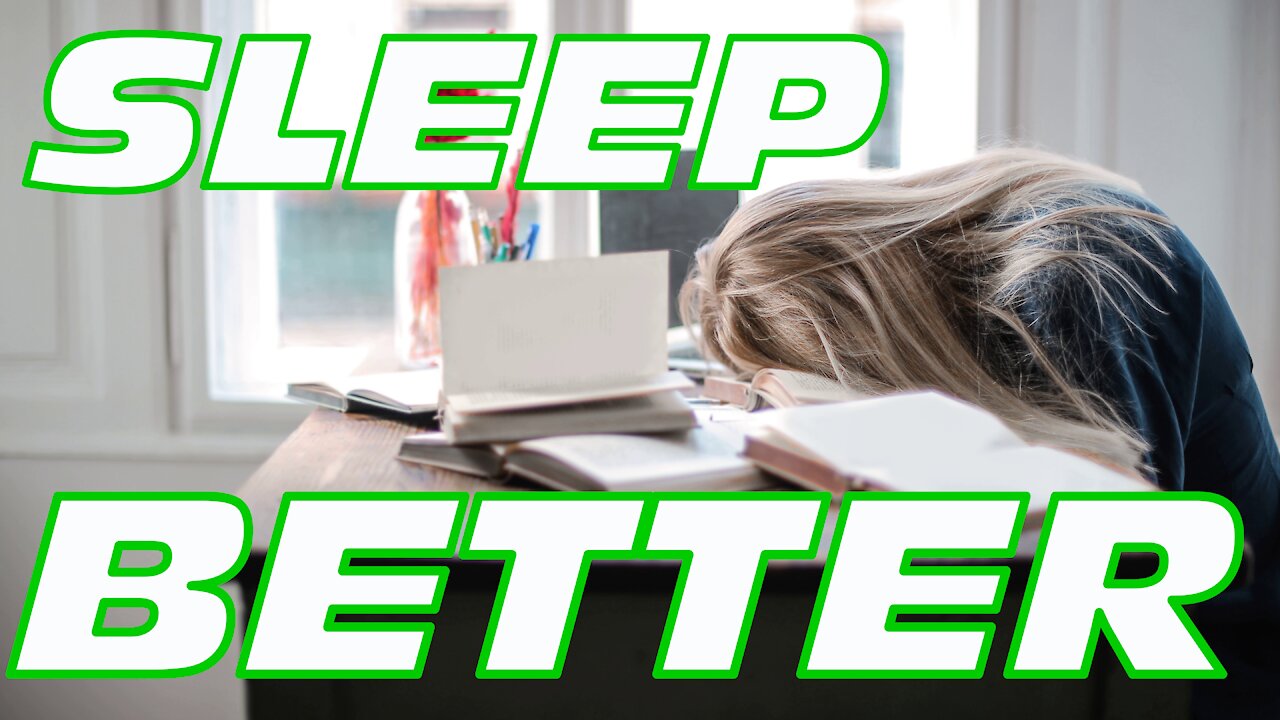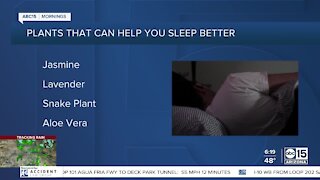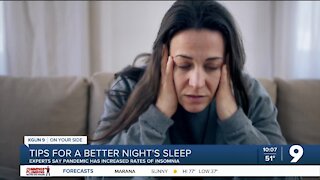Premium Only Content

How to sleep better?
ello everybody and let`s start.
Good quality sleep straightforwardly influences your psychological and actual wellbeing. Miss the mark and it can negatively affect your daytime energy, profitability, enthusiasm, and even your weight. Human body have substantially more power over the nature of your rest than you presumably figure it out. How you feel during your waking hours regularly depends on how well you rest around evening time, so the solution for rest troubles can frequently be found in your every day schedule. By exploring different ways regarding the accompanying tips, you can appreciate better rest around night time, help your wellbeing, and improve how you think and feel during the day. And now time for:
Tip 1 is Exercise during the day
People who exercise regularly sleep better at night and feel less sleepy during the day. Regular exercise also improves the symptoms of insomnia and increases the amount of time you spend in the deep, restorative stages of sleep.
The better you exercise, the more powerful the sleep benefits. But even easy exercises, such as walking for just 20 minutes a day improves sleep quality.
It can take several months of regular activity before you experience the full sleep-promoting effects. So be patient and focus on building an exercise habit that sticks.
For better sleep, time your exercise right
Exercise speeds up your metabolism, elevates body temperature, and stimulates hormones such as cortisol. This isn’t a problem if you’re exercising in the morning or afternoon, but too close to bed and it can interfere with sleep.
Try to finish moderate to hard workouts at least three - four hours before bedtime. If you’re still experiencing sleep difficulties, move your workouts even earlier. Relaxing, low-impact exercises such as yoga or gentle stretching in the evening can help promote sleep.
2 Tip is to limit caffeine and nicotine at least 3-7 hours before going to bed
"Caffeine is a central nervous system stimulant that increases alertness and reduces sleepiness," making getting to sleep difficult, You might be surprised to know that caffeine can cause sleep problems up to ten to twelve hours after drinking it! Caffeine enters the bloodstream through the stomach and small intestine and have a stimulating effect as soon as 15 minutes after it is consumed. Once in the body, caffeine will persist for several hours: it takes about 6 hours for one half of the caffeine to be eliminated and the caffeine can take up to 24 hours to fully leave your body. Because of this, the Sleep Health Foundation recommends that it may be wise to avoid that last cup of coffee or tea, or other caffeinated foods and drinks at least 3–7 hours before bedtime – or even stop at lunchtime if you’re having sleeping problems. This gives your body more time to process it, and may help you catch better quality sleep, wake up feeling more refreshed and be less dependent on caffeine.
Smoking is another stimulant that can disrupt your sleep, especially if you smoke close to bedtime. Smoking tobacco is incredibly addictive. This is mostly due to the presence of nicotine (a stimulant) in tobacco products. Nicotine is a nightmare when it comes to restful nights. Smokers wake up more frequently during the night. Smokers have trouble falling asleep, and feel restless in the morning. The average person loses 1.2 minutes of sleep for every cigarette they smoke, due to nicotine's stimulating and subsequent withdrawal effects.
3 Tip Avoid alcohol before bed.
Regular drinking can affect the quality of your sleep making you feel tired and sluggish. This is because drinking disrupts your sleep cycle.
Several sleepless nights have an impact on our day-to-day mental health, for example, on our mood, concentration and decision-making.
Alcohol messes with your sleep cycles, resulting in more arousals, and causing you to spend less time in the important deep sleep stages. After a short time about two hours, depending on your metabolism ― your body will start trying to wash out the alcohol, which it views as a toxin. This process is accomplished by pulling water from cells and flushing out the toxin through the kidneys and bladder (which is why you have to get up and pee so often).
On top of this, alcohol suppresses the anti-diuretic hormone in your body, which can contribute to even more bathroom trips. And when you’re going to the bathroom regularly, you’re losing essential electrolytes. After about the first hour and a half of sleep your body falls into a REM cycle, but alcohol can actually reduce the effectiveness of that sleep stage or even skip the first cycle. This is when you dream and it’s considered the most restorative sleep state. Alcohol consumption leads to missing several REM cycles, which leaves your mind sleep-deprived. The REM cycle restores your brain while deep sleep restores your body. Since alcohol can put you directly into a deep sleep, it gives off the sensation of having had a restful sleep, but you can wake up mentally exhausted. This is why staying asleep for more than a few hours after drinking can be difficult.
4 Tip Learn how to get back to sleep
Postpone worrying and brainstorming. If you wake during the night feeling anxious about something, make a brief note of it on paper and postpone worrying about it until the next day when it will be easier to resolve. Similarly, if a great idea is keeping you awake, make a note of it on paper and fall back to sleep knowing you’ll be much more productive after a good night’s rest.
Stay out of your head. Hard as it may be, try not to stress over your inability to fall asleep again, because that stress only encourages your body to stay awake. To stay out of your head, focus on the feelings in your body or practice breathing exercises. Take a breath in, then breathe out slowly while saying or thinking the word, “Ahhh.” Take another breath and repeat.
Make relaxation your goal, not sleep. If you find it hard to fall back asleep, try a relaxation technique such as visualization, progressive muscle relaxation, or meditation, which can be done without even getting out of bed. Even though it’s not a replacement for sleep, relaxation can still help rejuvenate your body.
5 tip Try to avoid big meals and avoid a lot of liquids in the evening
Try to make dinnertime earlier in the evening, and avoid heavy, rich foods within two hours of bed. Spicy or acidic foods can cause stomach trouble and heartburn. Cut back on sugary foods and refined carbs. Eating lots of sugar and refined carbs such as white bread, white rice, and pasta during evening time can trigger wakefulness at night and pull you out of the deep, restorative stages of sleep. . However, if you’re stocking up on sugary foods right before bedtime it can pull you out of deep restorative REM sleep and place you in a lighter REM sleep pattern. Not only does this affect your overall quality of sleep, it means you’re more vulnerable to waking up during the night and it could even affect your dreams!
Sleep not only allows your mind to rest, it’s also an important restorative process for your whole body. During the day, your digestive system in particular is bombarded so it’s only natural that at night, it gets an opportunity to rest!
However, if you go and eat a big meal before bed, it rouses your digestive system which will be sluggish and not all that efficient. This can mean you experience a few uncomfortable symptoms such as bloating or constipation.
When people sleep, they can lose about one to one-and-a-half pounds of water. That’s why it is typically a good idea to weigh yourself in the morning if you want the lowest number on the scale! Breathing, sweating, and even getting up to urinate in the middle of the night all contribute to fluid loss. The problem arises when you drink too much water, especially right before bed. It could easily lead to having to get up to use the restroom, and the sleep interruption. A general rule of thumb suggests you avoid drinking water two hours before sleeping to avoid waking up at night. Most online guides will suggest drinking eight cups of water per day on average, though this may vary depending on your needs. For instance, you may need to consume more water if you’re physically active or if it’s hot outside. Staying hydrated during the day by drinking enough water is one aspect of good physical, emotional, and mental health.
Thanks for watching and hopefully see you again in my future videos.
-
 1:01
1:01
KTNV
3 years agoSleep Tip: Bedtime Routines for Better Sleep
30 -
 8:00:54
8:00:54
SoothingCinema
3 years ago $0.01 earnedOcean Waves For Better Sleep
279 -
 36:20
36:20
BRenewedWellness
3 years ago $0.01 earnedSecrets to Better Sleep JJTR - January 2021
36 -
 1:31
1:31
KNXV
3 years agoThe BULLetin Board: Plants that can help you sleep better
14 -
 2:09
2:09
KGUN
3 years agoTips for a better night's sleep: experts say pandemic has increased insomnia
18 -
 3:12
3:12
WMAR
4 years agoLosing sleep? Here's some tips to help better your bedtime routine
9 -
 2:01
2:01
KJRH
4 years agoGetting Better Sleep
362 -
 1:00:26
1:00:26
Candace Show Podcast
7 hours agoPiers Morgan x Candace Owens | Candace Ep 123
84K212 -
 2:06:51
2:06:51
Darkhorse Podcast
10 hours agoFollow the White Rabbit(s): The 256th Evolutionary Lens with Bret Weinstein and Heather Heying
61.5K27 -
 3:08:08
3:08:08
Scammer Payback
8 hours agoCalling Scammer Live
36.5K3